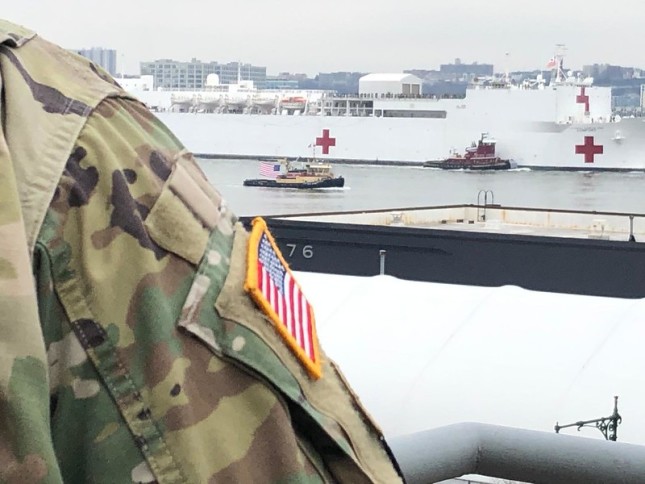-
Health Security is National Security

In the last several weeks, editorials by former U.S. national security professionals, particularly in The Washington Post and Just Security, argued for the need to expand the definition of national security in light of the coronavirus. Such expansion, they assert, should include climate change and infectious diseases like the coronavirus. Their pleas call for greater emphasis on human security in the national security discourse.
One could argue there is already an emphasis on human security. The 2019 Worldwide Threat Assessment of the Intelligence Community contains a whole section on human security, which includes infectious diseases and climate change. In its assessment, the world and the United States were vulnerable to the next pandemic a year before Covid-19 struck.
Prioritizing Human Security
However, the issue isn’t that we don’t think at all about human security; it’s how we prioritize it. Human security refers to the security of individuals rather than the state. These issues are often sidelined in favor of more “traditional” issues, according to Human and National Security: Understanding Transnational Challenges by Derek Reveron and Kathleen Mahoney-Norris.
How we define “traditional” security issues shapes whether issues like climate change or global health receive serious attention. When articles refer to human security as “non-traditional” security, this implies that more accepted, tangible, and mainstream interpretations of national security exist. As a result, the population is more likely to anchor their definitions of national security to that more generally accepted interpretation that aligns more with “great power competition” and terrorism.
Word Choice Matters
Some might downplay this discussion as one of semantics, but semantics can affect national security policy. Language is an extension of attitudes. And attitudes influence thoughts and actions, according to Richard Perloff. Using “non-traditional” security language to describe human security, like pandemics and climate change, will influence future responses to these issues. Specifically, phrases like “non-traditional” security can result in the systemic, inadvertent dismissal of topics that, in reality, might be consequential in shaping the threat environment.
We prefer the term “contextual security” when describing human security issues, rather than “non-traditional security.” Human security is the context that nations and people must ensure to achieve long-term stability. Describing human security in the language of context, rather than tradition, produces a more holistic understanding of threats, their root causes, and their stressors based on human factors at various levels of society.
Prioritizing Health
Nothing is more fundamental to a state’s security than the health of its people. If people are unhealthy, they can’t work. If they can’t work, they can’t contribute to the economy. If they can’t contribute to the economy, the government can’t provide services and infrastructure. If the government can’t provide services and infrastructure, then they are persistently vulnerable to security threats from state and non-state actors or from natural threats like climate change and diseases.
During the Peloponnesian War between Athens and Sparta, a plague in Athens reduced the population by 25 percent. Diseases, some of which were deliberately weaponized, slaughtered First Nation peoples when the Europeans colonized the Americas. Death by disease tested the command of General George Washington and the resolve of the Continental Army throughout the American War of Independence.
Even now, military readiness is being challenged by the coronavirus pandemic.
As natural disasters begin to strike, the Federal Emergency Management Agency (FEMA) probably will struggle to balance disaster and pandemic response efforts. This could increase reliance on U.S. military resources for assistance. Relief shelters after disasters might even exacerbate coronavirus transmission due to crowding. The United States is resilient, but not immune to these vulnerabilities, even if Dr. Anthony Fauci is “cautiously optimistic” that the United States could start reopening in May.
What Comes First
According to Reveron and Mahoney-Norris, “the national security of states cannot be achieved without first achieving human security.” In the last several months, it was not a cyberattack that shut down several parts of the global economy. It was not a military invasion that forced people to stay inside. It was not the casualties of a terrorist attack that brought healthcare systems to their knees.
It was a virus, a contextual and human security issue. Though not widely perceived as such now, climate change, an issue itself, will make these viruses a bit more “traditional” in the future by making them more common. Contextual security issues do not respect contemporary norms of national sovereignty. Whether we are prepared for them depends on how we define and respond to them now.
Jordan Beauregard is an intelligence analyst with the U.S. Defense Intelligence Agency, specializing in understanding the operational environment, and a graduate student at the National Intelligence University researching the institutional incorporation of climate change into national security discourse. The views and opinions expressed in this article are those of the author and do not reflect the official positions of the U.S. Department of Defense, Defense Intelligence Agency, or the U.S. government.
Roxana Kazemi is a graduate student at Virginia Polytechnic Institute and State University who conducts clinical work in marriage and family therapy, including in how contextual therapy approaches can promote long-term student welfare and security in K-12 urban education systems and communities. The views and opinions expressed in this article are those of the author and do not reflect the official positions of Virginia Polytechnic Institute and State University.
Sources: Army Heritage Center Foundation, Defense One, “Human and National Security” by Derek Reveron and Kathleen Mahoney-Norris, Just Security, Military.com, Mount Sinai Journal of Medicine, Science, Senate Select Committee on Intelligence, The Dynamics of Persuasion by Richard Perloff, The New York Times, The Washington Times, Centers for Disease Control.
Photo Credit: The USNS Comfort arrives in New York City, March 30, 2020. U.S. Air National Guard photo by Captain Joe Nolan.
 A Publication of the Stimson Center.
A Publication of the Stimson Center.



